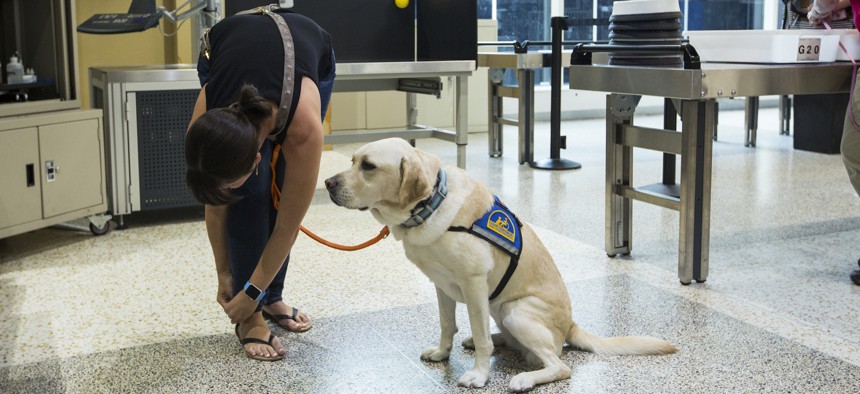Senators call for Transportation to offer ‘accessible, mobile-friendly’ service animal form

A traveler and service dog in George Bush Intercontinental Airport in Houston. Two senators are teaming up to urge the Transportation Dept. to simplify online forms used to credential service animals for air travel. Brett Comer/Houston Chronicle via Getty Images
Sens. Ron Wyden, D-Ore., and Tammy Duckworth, D-Ill., called the paperwork that disabled Americans need to complete before traveling with their service animals “poorly designed and needlessly difficult to complete.”
Two senators are pressing the Department of Transportation to digitize paperwork that Americans with disabilities need to complete before they can travel with their service animals, calling both the current form and an updated proposal “inaccessible, demeaning and time-consuming.”
In a Jan. 12 letter to Transportation Secretary Pete Buttigieg that was publicly released on Wednesday, Sens. Ron Wyden, D-Ore., and Tammy Duckworth, D-Ill., said constituents have reached out to their offices with concerns that the agency’s service animal form is “poorly designed and needlessly difficult to complete.”
DOT’s current service animal form went into effect in 2021, and the agency is in the process of soliciting public feedback on an updated version. The lawmakers said, however, that the current form — as well as the updated proposal — “violates both federal law and policy issued by the Biden administration.”
Previous legislation — such as the 21st Century Integrated Digital Experience Act, which was signed in 2018 — and ensuing policy from the Office of Management and Budget implementing the law also said agencies should prioritize the “design and development of digital forms… over the creation of paper forms or electronic forms.”
President Joe Biden’s December 2021 executive order on transforming the federal customer experience also called, in part, for high-impact service providers — including DOT — to focus on “streamlining and improving accessibility of forms and digital experiences” and “ensuring the accessibility of services for customers with disabilities.”
Wyden and Duckworth noted in their letter that DOT only offers the service animal form as a PDF file, which they called “an outdated electronic format that is particularly difficult to access and interact with when using mobile devices or screen readers and other assistive technology, which are essential for many people with disabilities.”
As DOT finalizes its updated service animal paperwork, the lawmakers wrote that the agency should work to offer “an accessible, mobile-friendly, web-based form."
The letter also noted that “DOT permits airlines to require travelers with service animals to complete a new copy of the form before each trip,” which Wyden and Duckworth said only amplifies existing accessibility concerns for disabled travelers.
The lawmakers want the agency to "provide travelers the option to store a digital copy of their form that they can re-use, update when necessary and submit digitally to airlines, such as through a QR code or another machine-readable format."
In addition to digitizing the service animal paperwork and making it mobile-friendly, Wyden and Duckworth also said DOT should “remove all duplicative or unnecessary fields” from the form, establish a telephone helpline to help disabled travelers with filling out their paperwork and “remove the redundant and threatening legal warnings from the form that may dissuade Americans with disabilities from asserting their civil right to access air travel on equitable terms.”






